Reflections and Industry Insights
NBI and RMI were thrilled to bring together over 360 industry leaders in Charlotte, North Carolina for the 2024 Getting to Zero Forum. It was an invigorating gathering, filled with thought-provoking conversations and concrete examples of transforming ambitious aspirations into achievable goals. Collectively, the broad cross-section of industry stakeholders shared inspiring solutions, innovative technologies, compelling case studies, and best practices for zero energy and zero carbon buildings.
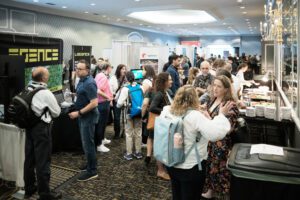
Charlotte was a prime location to help catalyze local engagement for decarbonization in the Southeast U.S. It provided a venue for policymakers, designers, building owners, systems manufacturers, governments, and community partners to share insights and lessons learned from the region and throughout the country. The in-person collaboration was energizing and impactful for advancing equitable decarbonization and building resiliency across sectors.
The 2024 Forum saw strong support from local and national community partners. This year’s community partners included the Carbon Leadership Forum, Southeast Sustainability Directors Network (SSDN), Southeast Climate & Energy Network (SCEN), Emerald Cities Collaborative, The Passive House Network, Midwest Building Decarbonization Coalition (Midwest BDC), NC Sustainable Energy Association (NCSEA), EarthShare North Carolina, North Carolina Black Alliance, California Energy Alliance (CEA), and Southeast Energy Efficiency Alliance (SEEA).
Creating Resilient Communities and Meaningful Equity in Decarbonization
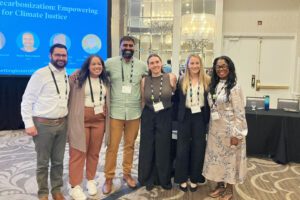
Over the three-day program, the breakout sessions delved into diverse and vital topics. These included the pivotal role of policy and project funding for no-cost and low-cost energy waste solutions in equitable decarbonization and affordable energy security. Sessions addressed the work being done across sectors to advance equitable decarbonization, electrification, heat mitigation, and create resilient communities.
In the breakout session “Equity in Decarbonization: Empowering Communities for Climate Justice,” Marnese Jackson, executive director of Midwest BDC, reminded attendees to build trust with environmental justice partners and establish programs with sustaining power that provide opportunities for participants, rather than temporary solutions. Megan Leary, community engagement and policy manager from Emerald Cities Collaborative shared a call to action: provide more funding for pilot projects in local communities and simplify the reporting requirements. Leary also expressed hope to see more organizations consistently showing up in local communities, sponsoring environmental justice community programs to increase capacity, and bringing in technical partners to work directly with these organizations. During a breakout session titled, ‘Innovations for Grid-Interactive and Resilient Buildings and Affordable Housing,‘ attendees participated in a group discussion about the challenges of split incentives and how to get landlords and tenants to come together to advance decarbonization and create safer, healthier, and more efficient housing.
Designing Pathways Towards a Carbon-neutral Future
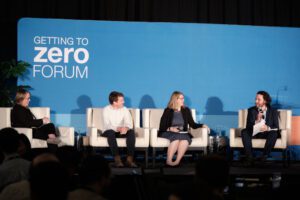
Throughout the Forum, experts presented innovative solutions, emerging national trends to address embodied carbon, and strategies for securing net zero funding. One theme that emerged was the need for long-lasting, resilient buildings to stretch our use of carbon further into the future by minimizing major renovations and building replacements.
Dr. Carolyn Snyder of the U.S. Department of Energy moderated the opening plenary session discussion. The panelists included Illya Azaroff from the AIA Board of Directors, Lucas Hamilton from Saint-Gobain, and Holly Paeper from Trane Technologies. They discussed leveraging collaboration to create blueprints for addressing equity, resiliency, and energy reduction. They also shared frameworks for developing design excellence, industry alignment, and insights about technology’s impacts on carbon emissions.
The closing plenary discussion, moderated by Conor Mulderrig from the North Carolina governor’s office, featured Ashley Armstrong from the U.S. Department of Energy (DOE), Tory Clark from Energy and Environmental Economics, Inc. (E3), and Matt Flaherty from Clean Energy Works. The panel examined mobilizing ecosystems to create sustainable buildings, futureproofing against rising temperatures, driving mass adoption of decarbonization technologies, and helping communities overcome upfront-cost barriers with inclusive utility investment policies.
Another highlight from the closing plenary was hearing from student finalists in this year’s Solar Decathlon Design Challenge. Mehak Chopra and Tiffani Vasco from Virginia Commonwealth University shared their innovative design for an affordable net zero rowhouse that emphasized health, equity, and multi-generational accessibility to address housing needs in a historically redlined, rapidly gentrifying neighborhood in the Southside of Richmond.
The Power of Innovation, Collaboration, and Emerging Technologies
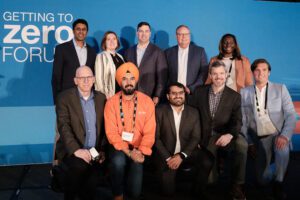
Conversations also centered on the role of AI and machine learning in building optimization, cost-effective approaches for electrification and building-grid integration, creating impactful change through collaboration, and the necessity of widespread market adoption of affordable clean energy technologies.
The lunch plenary showcased new technologies for scaling building decarbonization. Startups affiliated with Breakthrough Energy Ventures (including Microsoft, Siemens, Turner Construction, Blue Frontier, enVerid Systems, CarbonCure, 75F, and LuxWall) highlighted the power of innovation and its potential to shape our future.
During breakout sessions, speakers also presented case studies, emerging technologies, and key strategies to reduce overall building electrical loads while improving comfort, air quality, and resilience. These strategies included building electrification, bi–directional grid communication, flexible demand management, and energy storage to facilitate cost-effective decarbonization and reduce greenhouse gas emissions.
Shifting the Industry Toward Equity, Diversity and Inclusion
Supporting Environmental Justice Leaders
Continuing our efforts from past years to expand participation, NBI funded 18 leaders from environmental and climate justice organizations that are developing affordable housing and working with communities to lower energy burdens to attend the 2024 Forum. These scholarships allow people who otherwise wouldn’t be able to join us to participate as speakers and attendees, widening the perspectives shared at the Forum. One of the scholarship recipients, Brayndon Stafford, an environmental justice coordinator at North Carolina Black Alliance, shared that for him, the Forum offered a unique opportunity to “connect with industry partners and organizations doing great clean energy work, which actively served as a means to gameplan on how to best serve our constituents. Overall, this opportunity to learn, connect, and grow was impactful to the work we do, and I thoroughly look forward to the next conference!”
Fostering The Next Generation Of Diverse Buildings Industry Leaders
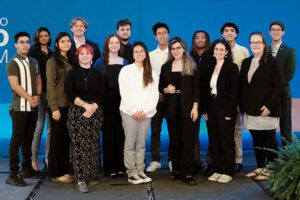
Additionally, the 2024 Forum hosted 15 students from the New Building Institute’s Next Gen program, a professional development cohort designed to promote inclusivity in the industry, providing advanced learning, mentorship, and networking opportunities with a focus on supporting students of color.
At the conference, students had the chance to connect in person for the first time, attend sessions, and network with speakers and conference attendees. Many were inspired by the innovation, passion, and connections—seeing the event as an incredible opportunity to accelerate their careers. They were surprised by the diverse mix of jobs and industry sectors represented at the Forum, and how this led to unexpected opportunities and discussions. “It was an absolute pleasure to be able to attend the 2024 Getting to Zero Forum in Charlotte, NC,” said Maasia Si-Asar Apet, one of this year’s Next Gen students.
“I took advantage of this great learning experience and networking opportunity with industry-leading professionals. I was able to gain a plethora of knowledge in getting our building infrastructure to net zero.”
Next Steps
Join us again next spring for the 2025 Getting to Zero Forum. Sign up for Getting to Zero updates to stay informed as we release dates and details about the next Forum.
Interested in becoming a sponsor for the 2025 Getting to Zero Forum or NBI’s Next Gen student program? Please reach out to Meghan Humphreys to learn more.
by Anna Zamir, Associate Director of Internal Marketing and Communications
Bio

